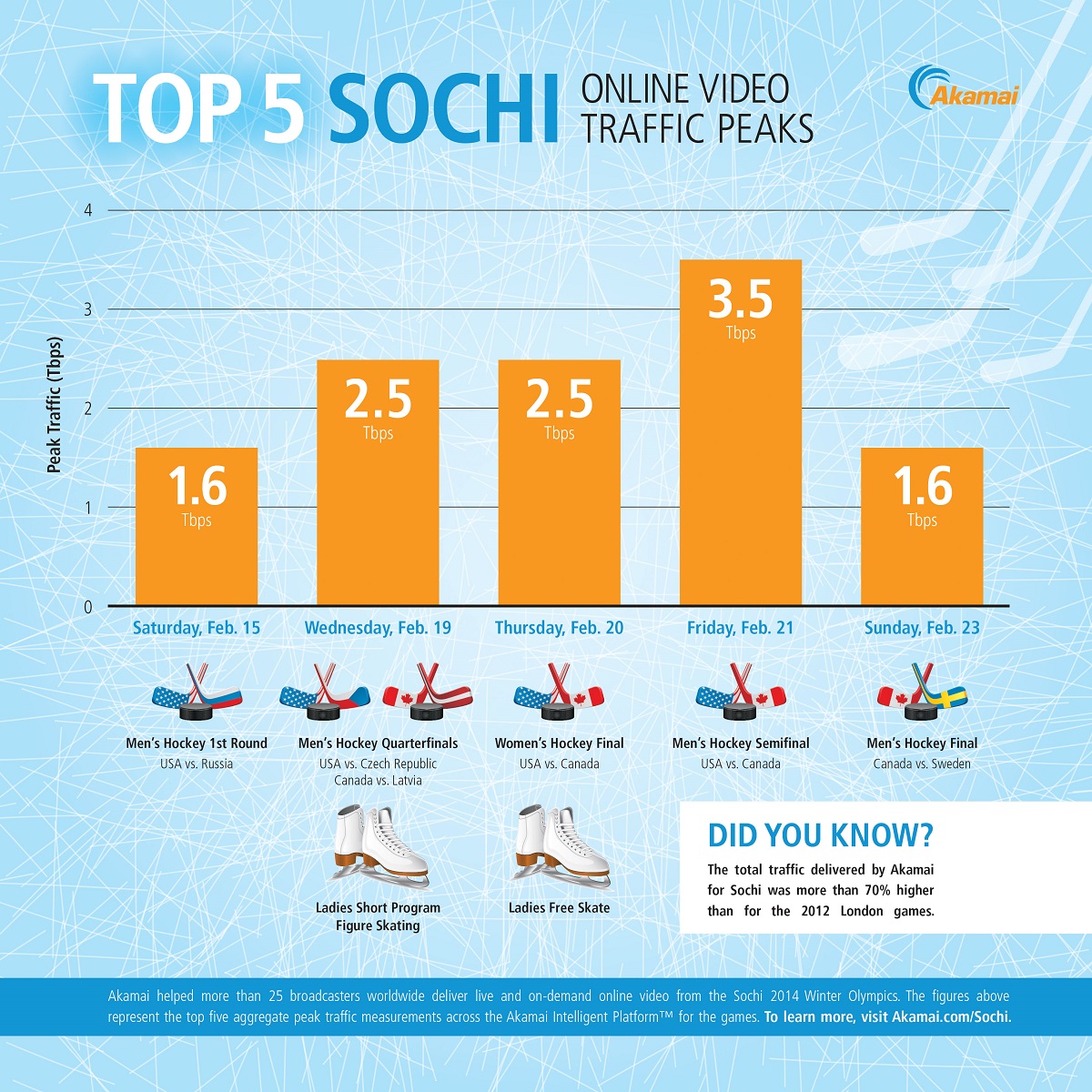The Sochi Games: A view into the future
By Nakul Srinivas April 23, 2014
- Some project video consumption will account for 90% of all consumer traffic by 2016
- Sochi Games changed online viewing experience, especially via multi-device access
 TODAY, users no longer go online; they are online. Online media is transforming our world at a global scale, enabling a truly hyperconnected world in which the sharing and consuming of media is at an all-time high.
TODAY, users no longer go online; they are online. Online media is transforming our world at a global scale, enabling a truly hyperconnected world in which the sharing and consuming of media is at an all-time high.
This continuous acceleration shows no signs of slowing either. By the end of 2011, video consumption accounted for more than half of consumer Internet traffic and some projections indicate that it will reach nearly 90% by 2016.
Being able to handle these demand spikes, whether expected or unexpected, is critical to successfully streaming online events.
At the Sochi Games, peak traffic occurred during the men’s half-pipe competition on Feb 11, when Louri Podladtchikov unexpectedly won the gold medal while competing against the two-time gold medalist Shaun White.
Traffic also peaked (for a single event) at 3.5 Tbps (Terabits per second) when Canada and the United States faced off in men's hockey. [Note: 1 Tbps = 1,000 Gbps]
The second highest peak was 2.5 Tbps during the simultaneous and popular hockey games and figure skating.
Daily traffic continued to grow from opening ceremony's 1 Tbps through the course of the event as viewers downloaded Sochi apps and the excitement of the games increased.
The Winter Games clearly showed that online viewing is becoming the future at a pace that far exceeds what anyone anticipated.
With the explosive growth in connected devices, traffic in the Sochi Olympics far outpaced that seen in London less than two years ago, and these peaks continue to move higher as audiences consume media through various devices, thereby increasing their awareness of the online streaming opportunities.
The Sochi Games were not only big from an online viewing perspective – this event truly changed the watching experience through the multi-device access.
People were watching the games live through a television broadcast or tablets while on the move. If they happened to miss the show due to other commitments, they watched it on-demand.
Catching a short clip of a goal scored in hockey or an unexpected sporting moment became as easy as a click away on the smartphone.
This whole ecosystem of multiple devices working in tandem, giving a quality holistic experience, has tremendously increased availability and proximity of the wanted content and is now a force to reckon with.
At the Beijing Olympics, the iPad didn’t exist. At Sochi, the whole Winter Games was reliably streamed in high quality – much of it in HD (high definition), to all Internet-enabled devices.
While traffic statistics are interesting for tracking the magnitude of the events, they also attract attackers interested in defacing such high profile events. To stay safe from defacement and distributed denial of service (DDoS) attacks, NBC Olympics implemented a cloud-based site and web application security solution.
As a result, the company did not report any compromises in the performance of its digital properties due to malicious traffic during the course of the Winter Games.
Sochi showed that all major broadcasters now understand that online viewers expect to see every second of competition without delays or dropped streams and that demand is only going to grow stronger.
Nakul Srinivas is product marketing manager, Media, Asia Pacific & Japan, at Akamai, which worked with over 25 leading global broadcasters, including NBC Olympics, to deliver the action, excitement and inspiration of the Sochi Games to online viewers.
Related Stories:
Can’t go to the Olympics? Never mind, there’s always YouTube
South-East Asians prefer social media to enjoy Olympics: Survey
For more technology news and the latest updates, follow us on Twitter, LinkedIn or Like us on Facebook.



